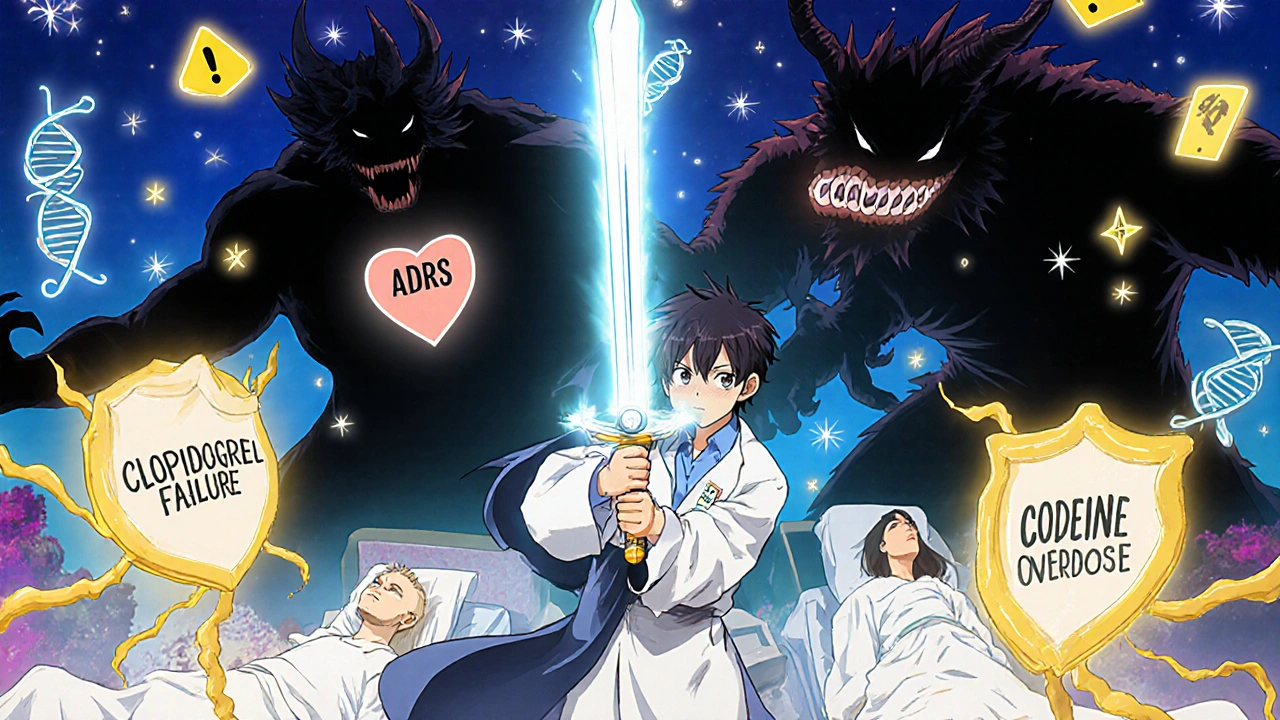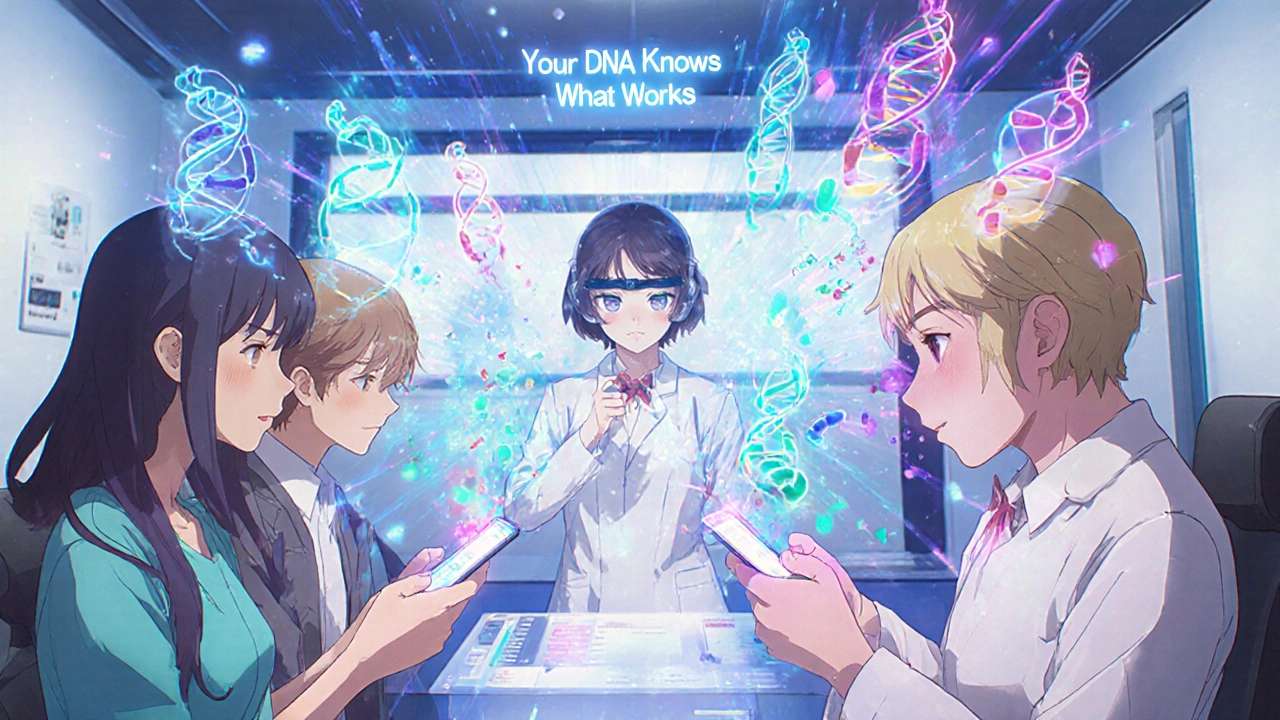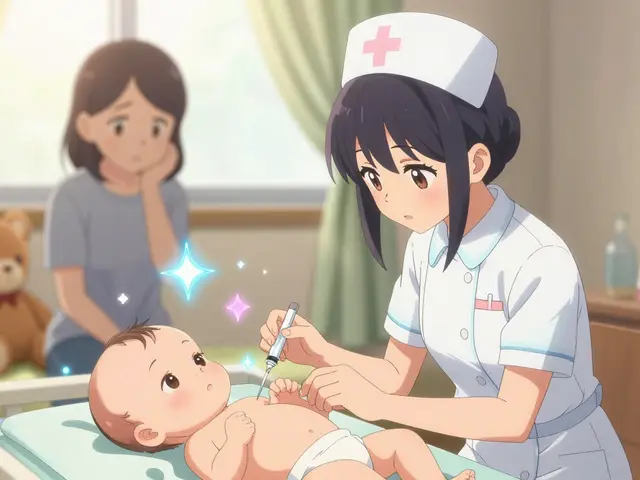Every year, hundreds of thousands of people end up in hospitals not because their condition got worse, but because a medication they were prescribed made them sicker. These are called adverse drug reactions - unexpected, harmful side effects that can range from mild rashes to life-threatening organ damage. For many, it’s not a matter of taking too much or taking the wrong pill. It’s their genes.
Imagine two people take the same dose of a common painkiller or antidepressant. One feels fine. The other ends up in the ICU. The difference? Their DNA. Pharmacogenetic testing looks at your genes to predict how your body will handle specific drugs. It’s not science fiction. It’s happening now in hospitals across Europe, the U.S., and Australia - and it’s cutting adverse reactions by up to 30%.
How Your Genes Control How Drugs Work
Your body doesn’t process all drugs the same way. Some people break down medications quickly. Others hold onto them like a sponge. This isn’t about liver health or kidney function - it’s about inherited variations in enzymes that metabolize drugs. The most important of these are the CYP450 family: CYP2D6, CYP2C19, CYP2C9, and CYP3A5. These enzymes are like molecular scissors that chop up drugs so your body can get rid of them.
If you’re a fast metabolizer, the drug vanishes before it can do its job. If you’re a slow metabolizer, it builds up to toxic levels. Take clopidogrel, a blood thinner used after heart attacks. About 30% of people have a CYP2C19 gene variant that makes the drug useless. They’re told to take it daily, but their body can’t activate it. They’re at risk of another heart attack - not because they didn’t take the pill, but because their genes blocked it.
Same goes for codeine. It’s a prodrug - meaning your body must convert it to morphine to work. If you have a CYP2D6 ultra-rapid metabolizer variant, you turn codeine into morphine too fast. One standard dose can cause fatal respiratory depression, especially in children. That’s why the FDA now warns against codeine for kids after tonsillectomies.
The PREPARE Study: Proof It Works
In 2023, the largest real-world trial ever done on this topic published its results in The Lancet. Called PREPARE, it followed nearly 7,000 patients across seven European countries. Before prescribing any new medication, doctors ran a simple blood or saliva test for 12 key genes linked to over 100 common drugs.
The results? A 30% drop in serious adverse drug reactions. That’s not a small win. That’s like preventing 3 out of every 10 hospitalizations caused by medication errors. The study didn’t just test one drug - it looked at antidepressants, statins, blood thinners, painkillers, and cancer drugs all at once. And it didn’t wait for problems to happen. It acted before the first pill was taken - preemptive testing.
Compare that to the old way: wait until someone gets sick, then try to figure out why. Reactive testing reduces ADRs by only 15-20%. Preemptive testing? 30%. The difference isn’t just statistical. It’s life-changing.
Genes That Save Lives
Some gene-drug pairs are so well proven, they’re now standard of care. Here are a few:
- HLA-B*1502 and carbamazepine: This gene variant is common in people of Asian descent. Taking carbamazepine (an epilepsy and bipolar drug) with this variant increases the risk of Stevens-Johnson syndrome - a terrifying skin condition that can kill. Testing before prescribing reduces that risk by 95%.
- TPMT and azathioprine: Used for autoimmune diseases and cancer. If you have a TPMT variant, your body can’t break it down. The drug builds up and destroys your bone marrow. Testing cuts severe side effects by 78%.
- DPYD and fluorouracil: A common chemotherapy drug. People with DPYD mutations can die from a single dose. Testing prevents this in 90% of cases.
- SLCO1B1 and simvastatin: This statin can cause muscle damage. A single gene variant triples the risk. Adjusting the dose based on genetics prevents this in most patients.
These aren’t rare conditions. One in four people carries at least one of these high-risk variants. The PREPARE study found that 93.5% of participants had at least one actionable result. That means almost everyone could benefit.

What’s Holding It Back?
Despite the evidence, adoption is still slow. Why?
First, cost. A full pharmacogenetic panel runs $200-$500 in the U.S. That’s not cheap. But here’s the flip side: one hospitalization from an ADR can cost $15,000-$50,000. The NHS estimates ADRs cost the UK £500 million a year - money spent treating side effects that could have been avoided.
Second, doctors aren’t trained for this. Only 37% of physicians feel confident interpreting results. A test says you’re a “medium metabolizer” for CYP2D6. What does that mean for your antidepressant? Most doctors don’t know. That’s why programs like the Clinical Pharmacogenetics Implementation Consortium (CPIC) exist - they give clear, step-by-step guidelines for what to do with each result.
Third, integration. If the test result doesn’t show up in the electronic health record with a warning when the doctor tries to prescribe, it’s useless. Systems need to alert: “Patient has CYP2C19 poor metabolizer variant. Avoid clopidogrel. Use prasugrel instead.” That’s not easy to build. But places like the University of Florida Health have done it. Since 2012, they’ve cut ADR-related ER visits by 75%.
Who’s Doing It Right?
The Netherlands leads the world in implementation. Their Dutch Pharmacogenetics Working Group (DPWG) created clear, evidence-based guidelines for 77 drug-gene pairs. Every hospital there follows them. In Australia, the Royal Adelaide Hospital has started testing patients on multiple medications before discharge. In the U.S., Medicare covers testing for TPMT before thiopurine drugs and CYP2C19 before clopidogrel. The FDA now lists 329 gene-drug pairs in its official database - up from 287 in 2022.
Even oncology and psychiatry are ahead of the curve. In cancer care, preemptive testing has prevented over 100 ADRs per 1,000 patients. In depression treatment, a trial with 685 patients showed a dramatic drop in side effects after three months of genotype-guided prescribing.
But primary care? Still behind. Only 18% of primary care clinics offer testing. That’s where the biggest gap is. Most people take multiple medications. That’s where the real danger lies - when five drugs interact with five gene variants at once.

What About Privacy and Equity?
Some patients worry about genetic privacy. Will their data be sold? Will insurance companies use it against them? In the U.S., GINA (Genetic Information Nondiscrimination Act) protects against health insurance and employment discrimination. But it doesn’t cover life insurance or long-term care. That’s a real concern.
Another issue: most genetic data comes from people of European descent. Variants common in African, Indigenous, or Asian populations are still under-researched. The NIH is now funding studies to fix that - adding over 120 new gene-drug links from underrepresented groups in 2024 alone. But progress is slow.
And cost remains a barrier. While $300-$500 is standard now, pilot projects using point-of-care PCR tests are bringing the price down to $50-$100 by 2026. That could make testing as routine as a cholesterol check.
The Future: Beyond Single Genes
Right now, we test one gene at a time. But drug response isn’t always that simple. Some people respond poorly not because of one gene, but because of a combination - polygenic risk. Early studies show that using multiple gene scores together improves prediction accuracy by 40-60% over single-gene tests.
Imagine a future where your doctor doesn’t just ask what drugs you’re on - they pull up your pharmacogenomic profile from your digital health record. It tells them: “This patient is a slow metabolizer of SSRIs, has high risk for statin myopathy, and responds better to metformin than sulfonylureas for diabetes.” That’s not a dream. It’s the next five years.
By 2026, 87% of major U.S. academic hospitals plan to offer preemptive pharmacogenetic testing. In Europe, the EU is spending €150 million to roll it out nationally. This isn’t a trend. It’s a transformation.
Medicine is moving from trial-and-error to precision. We’re no longer guessing what will work. We’re using your DNA to know.
What You Can Do Today
If you’re on three or more medications, especially for chronic conditions like depression, heart disease, or autoimmune disorders, ask your doctor: “Could pharmacogenetic testing help me avoid bad reactions?”
If you’ve had a bad reaction to a drug before - even a mild one - that’s a red flag. Your genes might be telling you something.
And if you’re about to start a new medication - especially one on the high-risk list like carbamazepine, azathioprine, or clopidogrel - request testing before the first dose. It’s not experimental. It’s evidence-based. And it could save your life.






Jessica Healey
November 18, 2025 at 13:56
I took clopidogrel for a year and got a nasty rash. My doctor just said "it happens." Turns out I’m a CYP2C19 poor metabolizer. They switched me to prasugrel and I’m fine now. Why wasn’t I tested before? I’m not a lab rat.